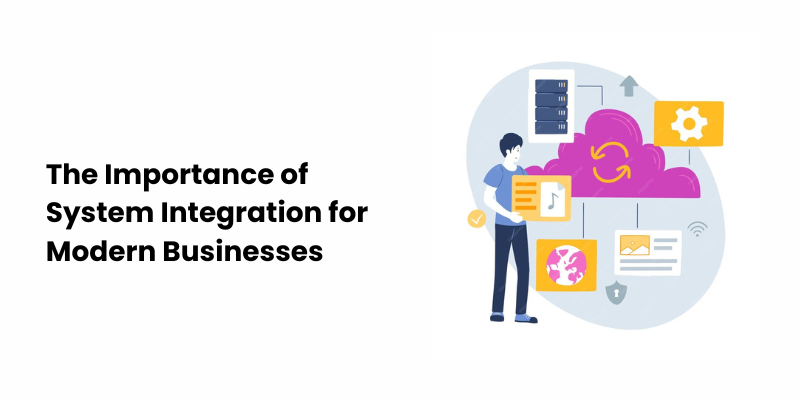Many times the term system integration floats across the business environment like a buzzword. However, what does this mean, and how does it end up becoming relevant to modern business as an important factor?
Well, you’ve come to the right place to learn more and why this is such a big deal moving forward for today’s companies.
It does not matter if you are a business manager of a small team or have the responsibility for a large department, the need for the standard systems integration process requires attention and prioritization in today’s highly competitive environment.
Well, without further ado, let’s start with knowing the basics.
What is System Integration?
System integration is a technical term that is used generally for the process of linking different subsystems or parts to function as a whole.
Based on this, system integration may be seen as a process that makes every part of a business smoothly interconnected similar to a single mechanism. The use of its implementation is appropriate if your system needs an enhancement of its performance, increased productivity, and more importantly the seamless communication between these systems.
For example, it is not only about making your CRM integrate with your ERP software. It is about integration between all layers of these technologies that you use within your organization.
Moving ahead, let's elaborate on this point in brief below – why system integration is important?
Benefits of System Integration For Modern Business
1. Improved Efficiency and Productivity
Can you believe that businesses lose 20% to 30% of their revenue due to inefficient processes?
Yes, that is the fact. Of course, you don't want to get into this situation. To avoid this, the best approach is to carry out system integration.
Wondering, why would you do that, not else? Well, when different parts of a company don't work well together, it can lead to problems like low productivity and wasted time.
Thus, relying on system integration consulting services from experts will work wonders here. It helps fix this by connecting these parts, making it easier for everyone to access information and work efficiently. This leads to faster and more effective processes.
2. Improved Communication
Just think about how nice it would be not to wait for somebody to send you some report, but just look and see real-time updates on your screen. Great, right?
Communication is easier with system integration. Ever felt the pain of one department not knowing what the other is doing?
The implementation of system Integration fills in these gaps, putting everyone on the same page. In this respect, the team members from different departments have fewer misunderstandings and smoother operations. Plus, it's way easier to coordinate and collaborate when everything's in sync.
3. Better Data Management
Actually, businesses collect around 2.5 quintillion bytes each day. With integrated systems, handling this much data becomes easier, and really simple. You get all the views of your data in a unified manner and analyze it to make strategic decisions more effectively.
4. Cost- Efficiency
Think about it: why spend money on several platforms when you can actually integrate them into one? System integration reduces the need to maintain multiple systems, which saves costs on software licenses and IT support. It is like getting more bang for your buck.
5. Scalability
If this often happens, when there is an expansion of business, the need for enhancing the storage capability of the system also becomes important. Most importantly, leaders must embrace leading cloud platforms like Azure, AWS, or else that offer them the flexibility to scale up their business without any disruption.
That's infinitely easier with the system integration process: just add functionalities painlessly, with no need to rewrite code. This way, your business can grow, but the growing pains may not be as insufferable- always a big plus point for your business.
Also Read:Top Software Development Companies in India
Challenges Often Faced During System Integration
Now, wouldn't that be unfair if we did not discuss the challenges? This integration of systems is indeed a complex task for a big business with numerous systems that are considered to be at a legacy level. Being aware of such challenges, though, may lead you to overcome them more confidently.
1. Compatibility Issues: Different systems use different technologies, and this might impose compatibility issues. All components should be able to communicate with one another.
2. Data Security: Integrating systems will mean that more data flows across systems, increasing the chances of data leakage. Ensuring data security should be one of the foremost concerns.
3. Cost of Implementation: Though savings in the long run are huge, the initial cost of system integration can be pretty high. Budgeting for it upfront may help ease the financial burden.
4. Resistance to Change: Let's face it-change is hard. Employees may be resistant to new systems and processes. It's very important to provide proper training and support to ensure a seamless transition.
Best Practices for System Integration
Here are some best practices to consider when performing system integration:
1. Define Clear Objectives: Being with defining what you want to achieve by system integration. Are thinking of integrating a chatbot application with your CMS, or else? This will not only help guide the whole process but also give a clear idea of what your success will look like.
2. Choose the Right Tools: Not all integration tools are created equal. Select a tool that fits your business needs and can scale as your company grows.
3. Involve Key Stakeholders: Representation from all related departments will make sure the integration will fit the needs of all. This will also be important in terms of buy-in and minimal resistance to change.
4. Test, Test, Test: You should thoroughly test your integrated systems before going live to find problems early that will save time and headaches later.
5. Train and Support: Provide your team with the knowledge and tools to confidently work in the new systems.
The Future of System Integration
The future of system integration looks brilliant, and here is what to expect:
1. More Artificial Intelligence: AI will be used more and more in system integration to automate mundane tasks and predict issues before they can happen. For integrating an AI-powered chatbot into your system, leveraging chatbot development services will be a crucial step.
2. Cloud-Based Integration: More businesses are moving towards cloud-based systems that are flexible and scalable. This trend is likely to continue as technology advances.
3. Integration of the Internet of Things: With the increase in IoT devices, integrating them into already existing systems will be one of the most important ways to capture data and insights valued by businesses.
Conclusion
Alright, so you're sold on the idea of system integration. But how do you get started? This is where system integration services come into play. Hire a dedicated software development team that will guide you through the integration process, ensuring that everything goes smoothly. They assess your current systems, identify areas for improvement, and implement the best integration strategies.
These professionals bring a wealth of experience and expertise to the table. They understand your business needs and work tirelessly to develop custom solutions.






